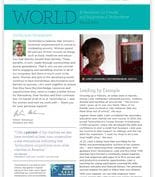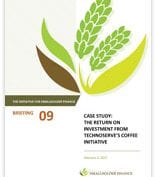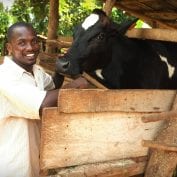Q&A: Rick and Wendy Walleigh on Volunteering in Africa
The authors of the new book From Silicon Valley to Swaziland discuss their encore career in development work, and why they are donating the royalties from their book to TechnoServe.
The authors of the new book From Silicon Valley to Swaziland discuss their encore career in development work, and why they are donating the royalties from their book to TechnoServe.
TechnoServe’s business accelerator program in Burkina Faso is connecting entrepreneurs with business advisors to help grow the next generation of businesses.
In partnership with the Gates Foundation, TechnoServe has helped thousands of East Africa’s smallholder farmers enter the supply chain for specialty coffee and earn higher incomes.
With the right mix of skills and confidence, rural youth in East Africa are building sustainable enterprises and creating new opportunities.

Empowering Young Women; Top Rating from Charity Navigator; New Sustainer Program…
TechnoServe helped to show how a new way of working with the supply chain can unlock the potential of Ghana’s smallholder farmers.
As demand for cocoa outpaces supply, smallholder farmers hold the key to ensuring a sweet and sustainable future for chocolate.

This briefing from the Initiative for Smallholder Finance Coffee Initiative offers a case study of TechnoServe’s Coffee Initiative, focusing on how technical assistance can increase access to finance for smallholder farmers, achieve scale and generate value for an industry.
The Guardian highlights TechnoServe’s innovative work with smallholder farmers and explores the role of for-profit companies in supporting agriculture in the developing world.

The Kenya Market Assistance Program helped to promote employment and income generation in various market systems in Kenya by addressing key constraints to growth in these sectors.